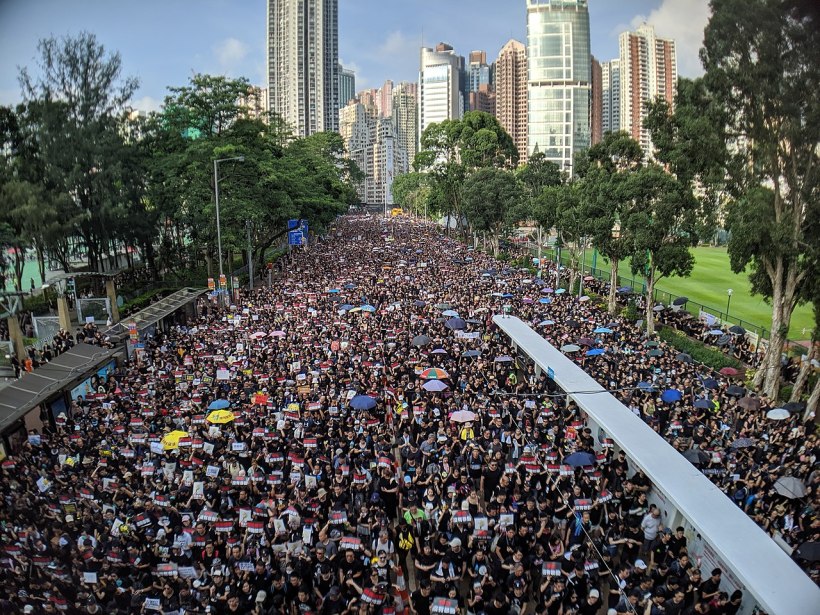
Sanjana Dhar, Research Intern, Institute of Chinese Studies, Delhi
Hong Kongers are known for mass protests whenever they have been pushed to a corner by their government. The present mass opposition and upheaval against a proposed extradition law by Chief Executive Carrie Lam, is driven by the same factor. But, this time precious rights and freedoms guaranteed under “one country, two systems” are at stake.
The Fugitive Offenders and Mutual Legislation (Amendment) Bill 2019, or the Extradition law of Hong Kong has garnered widespread attention. The proposed law deals with the extradition of fugitives from Hong Kong to Taiwan, Macau and mainland China. It was initiated by Carrie Lam in February 2019 and the motivation for it was due to a murder case, where a man from Hong Kong murdered his girlfriend in Taiwan and fled back home. Extradition requests made by Taiwanese officials could not be carried forward due to the absence of an extradition treaty between Hong Kong and Taiwan. Carrie Lam proposed this law in the hopes of filling a “legal loophole” because without a prior treaty in place, extradition cannot be carried out. With the formulation of a new extradition treaty, criminals cannot evade punishments for crimes committed in a different country.
The present situation of mass protests in Hong Kong is driven by the fact that the extradition law will give Beijing more leeway in matters of suppressing democracy and freedom in Hong Kong. Central authorities could arbitrarily arrest individuals who oppose their authority and bring them to justice under the opaque and politicised judicial system in the mainland. This is in contrast with the judicial system in Hong Kong, which is guided by rule of law. Beijing’s overbearing involvement in Hong Kong is in contradiction to the “one country, two systems” policy, which allows Hong Kong to maintain its partial democracy and free market within the territory of China. Fear of erosion of this policy has shaken the minds of the public and they are choosing to express this fear in the form of fierce protests.
Amidst popular discontent for the law, Carrie Lam initially had a strong position and vouched that the proposed law would in no way compromise human rights principles of Hong Kong. The final say in the granting of extradition requests would rest with Hong Kong and religious and political matters would be kept out of the purview. Yet, growing public dissatisfaction against the bill has undermined her image and created demands for her resignation.
The mass protests of 9 and 12 June is evidence of the dissatisfaction among Hong Kong citizens with the turn of events. It is testimony that Hong Kongers are ready for what has been touted as the “last fight” for safeguarding their democracy and freedom.
The protests on 12 June gave the people a temporary relief as the second round of discussions of the bill was cancelled due to blockades by protesters near the government headquarters. However, the protests took an unprecedented turn as the police used tear gas and fired rubber bullets at the protesters. Media outlets have dubbed it as violence which has never been witnessed in the history of Hong Kong and the police force is being held accountable by the public for such a blatant act. Rising protests after such violence has forced Carrie Lam to suspend discussions on the law indefinitely. Her apology for the negligence on her part in involving the opinions of the society in making the law and expediting the passing of the law at the cost of peace in Hong Kong has brought temporary relief, but the people do not intend to stop until the bill is entirely withdrawn.
Undoubtedly, these events have drawn the attention of the international community. Leaders all over the world have come out in support of the anti-extradition protests and voiced their concerns of Hong Kong transforming into an illiberal region, not suitable for its once reputed liberal, market oriented society. Multiple rallies have taken place worldwide in support of the protesters. Hong Kongers have also urged foreign leaders to discuss the situation in the G-20 Summit and back demands of withdrawal of the bill.
China is at the center of this issue, although its direct involvement in the matter is not clear. Regardless, Chinese foreign ministry spokesman, Geng Shuang initially came out in full support of the administration in Hong Kong. Beijing believed the involvement of “foreign forces” was aggravating the situation and filling the public with animosity towards the law, which would not jeopardise the rule of law and justice in Hong Kong. But Beijing has now backtracked and is in support of the suspension of the bill.
The shift in Beijing’s stance reflects the precarious condition China is presently in, due to the trade war with the USA and the slowing economy. Can Xi Jinping afford to counter the situation in Hong Kong through force and add another tragedy in China’s history or could the protests in Hong Kong further attenuate Beijing’s vulnerabilities, are some of the questions which are yet to be answered. But at the moment, Hong Kongers seem to have gotten the better of Beijing.
The black clad protests of 16 June of nearly two million people sent a strong message to the administration over the people’s demands of complete withdrawal of the bill. Protesters won’t be satisfied only with the suspension of the bill because they speculate the administration will bring back discussions once the protesters have calmed down.
The situation in Hong Kong demonstrates the resolution of the protesters and their concerns about erosion of the “one country two systems” and its eventual merging with the system present in mainland China. Fierce resistance of the people is not just against the extradition law, but this upheaval is critical for Hong Kongers to safeguard their prized rights and freedoms in the face of arbitrariness and subordination from Beijing.